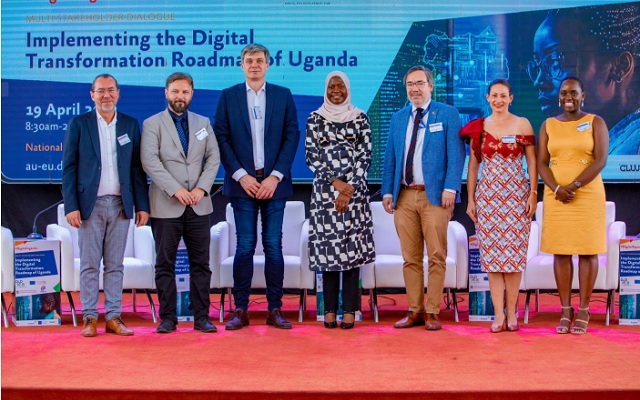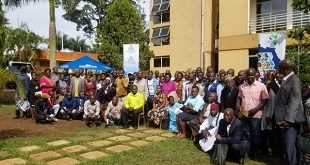
Kampala, Uganda | RONALD MUSOKE | The Ugandan government together with its European Union partners have embarked upon implementation of a five -year digital roadmap that is aimed at creating a more open, transparent and accessible government that “leaves no citizen behind.”
“Our aspiration is nothing short of transformative; (we wish) to create a more open, transparent, and accessible Uganda that leaves no one behind,” said Dr. Aminah Zawedde, the Permanent Secretary of the Ministry of ICT and National Guidance.
“We believe that digital technology can play a pivotal role in achieving this goal, by empowering individuals and communities, enhancing transparency and accountability, and fostering inclusive economic growth.”
Dr. Zawedde was speaking at a high-level stakeholder workshop on April 19 in Kampala. The meeting brought together both Ugandan and EU ICT experts to discuss how to coordinate better to ensure the government successfully implements its digital transformation roadmap which has been developed with the support of the United Nations Development Programme (UNDP).
The roadmap was unveiled by the Ministry of ICT and National Guidance at a meeting which was facilitated by GIZ Uganda (German Development Agency), Enabel (Belgian Development Agency), the Estonian Centre for International Development (ESTDEV) and the Cluj IT Cluster of Romania.
These are agencies which are part of the African Union—European Union (AU-EU) Digital for Development (D4D) Hub. The Hub supports African institutions to lay ground for an inclusive and sustainable digital transformation. It works with African governments and regional organizations to advance digital cooperation with European partners.
Lennart Deridder, the Team Leader for Inclusive Economy at the EU Delegation in Uganda told the meeting in Kampala that the EU is happy Uganda’s digital transformation roadmap is “well-aligned with the European Union’s Global Gateway initiative, which offers investment opportunities in infrastructure development.”
“This is aimed at connecting our people, societies and economies, through trust and sustainability,” Deridder said, adding that: “Digital transformation is an integral part of the cooperation of the European Union Delegation and its member states in a Team Europe approach in Uganda.”
“Experience has shown that actors often end up duplicating efforts due to lack of coordination, or great initiatives are not utilized to their full potential due to lack of information sharing,” said James Macbeth Forbes, the Country Director at GIZ Uganda.
“Strong leadership is needed to ensure the coordination is effective, and Uganda can look to other countries, both African and European, for best practices on how this can be achieved. Today we started the process, and we are looking forward to more exchanges in future.”
Uganda’s ambitious digital revolution
Uganda’s digital transformation roadmap, which is being developed with support of the United Nations Development Programme (UNDP), is aimed at developing complementary strategies which can accelerate Uganda’s digital revolution. More specifically, the roadmap is looking at streamlining investments in the government’s digital agenda.
According to the “Digital Uganda Vision,” the government aspires to have a digital and data-driven economy which is inclusive and empowering to Ugandans. The government hopes this will improve the country’s competitiveness in the world.
The digital vision is based upon five pillars including building digital infrastructure and connectivity; promoting digital services; boosting cyber security, data protection and privacy protocols as well as enhancing citizens’ digital skills through deliberate training. The fifth pillar seeks to improve the innovative and entrepreneurial spirit of Ugandans.
According to Uganda’s grand development blueprint—Vision 2040—ICT provides an opportunity to improve national productivity by making the government and business enterprises more efficient, effective and globally competitive.
However, at the moment, there is low level of business automation and use of ICT in industrial development and low local digital content. It is upon this reality that the government has identified the ICT sector as an area with potential to improve the availability of digital content and e-products, automation of government processes and inter-agency connectivity, as well as innovation to bridge the gap between industry and the academia and commercialization of research and Uganda shall develop, improve and retool its ICT talent building mechanism by adopting globally-benchmarked industry-rated skills assessment.
Ultimately, the government wants to catalyze a “whole-of-government” transformation by putting “as many as feasible public services online as possible, automating work functions and reducing paper work. The expected result of this is better delivery of services, open engagement and significant improvement in government operations.
Already, there is an ongoing collaboration between Uganda’s Public Procurement and Disposal of Assets (PPDA) and the African Union-European (AU-EU) Digital for Development (D4D) Hub. The GIZ is specifically working with the PPDA to advance the digitalization of Uganda’s public procurement processes. The collaboration is aimed at improving public sector efficiency in Uganda through digital transformation.
Public sector procurement in Uganda is a significant component of public expenditure management, which plays a critical role in ensuring effective service delivery, good governance, and sustainable development.
The sector accounts for up to 60% of the government’s expenditure and experts say increased uptake of digital public procurement could offer the government many opportunities to streamline processes, save resources and increase transparency and accountability.
Ugandans could also easily track the progress of their applications online, reinforcing confidence in public procurement systems. Procurement specialists could also access bidding information online, making the review process simpler and more efficient.
E-procurement could also make bidding on public projects more financially accessible for small and medium enterprises. Additionally, bidders could submit applications remotely, reducing the time and costs of travel to administrative offices. In terms of privacy, online applications could ensure the bidders’ identity remains confidential and is only disclosed after the bid opens. A digital system could also make it easier to blacklist poor performing contractors and improve the quality of public works.
Going forward, the meeting resolved to develop a coordination structure which will support the digital transformation once it gets approved.
“With this digital transformation roadmap, we have a very big opportunity to accelerate the digital revolution in this country,” said Innocent Ejolu, the UNDP Partnerships Innovation and Development Solutions Specialist.
“We are hoping that through these discussions we have today we can deepen understanding of where the digital transformation priorities are and how we work together to implement them.”
 The Independent Uganda: You get the Truth we Pay the Price
The Independent Uganda: You get the Truth we Pay the Price



